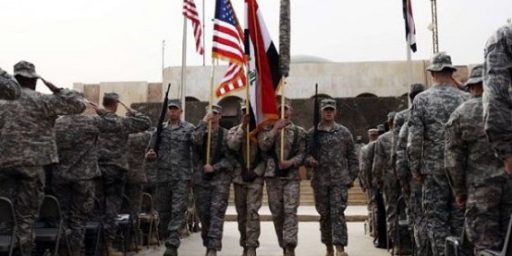Arbitrary Deadlines
George Will makes a pretty strong case that turning control of Iraq over to, well, whoever it is we’re turning it over to, on June 30 is unwise.
Now Americans must steel themselves for administering the violence necessary to disarm or defeat Iraq’s urban militias, which replicate the problem of modern terrorism – violence that has slipped the leash of states.
For the near term, U.S. policy must flow from Napoleon’s axiom: “If you start to take Vienna – take Vienna.” We started to take Iraq 13 months ago. That mission is far from accomplished.
***
Not much else having gone as planned since the fall of Baghdad, a delay in the transfer of sovereignty, scheduled for June 30, should not be unthinkable. A delay would trigger violence. But, then, the transfer on schedule probably would be preceded by an offensive by the insurgents.
The transfer is to be from the Coalition Provisional Authority, whose authority does not extend throughout the country. A U.S. official in Baghdad says Sadr will be arrested if he appears “any place that we control.”
The transfer is to be to an institutional apparatus that is still unformed. This is approaching at a moment when U.S. forces in Iraq, never adequate for postwar responsibilities, are fewer than they were.
U.S. forces in Iraq are insufficient for that mission; unless the civil war is quickly contained, no practicable U.S. deployment will suffice. U.S. forces worldwide cannot continue to cope with Iraq as it is, plus their other duties – peacekeeping, deterrence, training – without stresses that will manifest themselves in severe retention problems in the reserves and regular forces.
Since 9/11, Americans have been told that they are at war. They have not been told what sacrifices, material and emotional, they must make to sustain multiple regime changes and nation-building projects. Telling such truths is part of the job description of a war president.
While the evidence for the “severe retention problems” surprisingly points in the other direction, the point is well taken.
Robert Robb makes the countervailing case.
Were it not for the U.S. occupation, the two rebellious groups might very well be killing each other rather than Americans.
***
Simply put, too many Iraqis still see this as a U.S. fight rather than their own.
You often hear, even from initial opponents of the war, that the United States cannot now “fail” in Iraq. But that’s not an attitude necessarily conducive to our long-term national interest.
There can be different opinions about the extent to which Saddam Hussein constituted a threat to the United States. But whatever the level of the threat, it is now gone.
Moreover, whatever emerges in the wake of Saddam is highly unlikely to poise anywhere near the threat that he did.
This is a classic Realist argument and one I might have been sympathetic to under different circumstances. Indeed, had our stated objective merely been regime change with no talk of creating a beacon of democracy in the Middle East, this may well have been the course to take–a relatively quick strike to take out the enemy and then move on to objectives elsewhere in the war on terrorists. That wasn’t the case, however, and leaving the place in chaos would be a collosal failure. It would also send a signal that democratization in the Middle East, something clearly in our interest–to say nothing of the interest of the citizenry–is unachievable.




He makes a case, but it leaves out a critical flaw. Paul Bremer worked for 8 months to help forge an interrim constitution acceptable to most of the Iraqi power brokers. It was _barely_ passed. It specifically spells out a turnover of soveriegnty on June 30th, several times, its intrical to the document. At this point it will prove impossible to ammend the document. Attempting too will almost certainly open a can of worms where Sistani takes the opportunity to walk away from the document completely. That would be a disaster of epic proportions. We would have in fact ‘reopened the bidding’ with a weaker hand than we had when the constitution was approved. The only other option is to utterly ignore the document, which is an even larger disaster. Iraqis have seen enough of these documents come and go to know a phoney when they see one. If we dont hold to our agreements any trust we have now will be utterly and irrevocably destroyed. This is not an option. The date is firm, we have no alternative at this point that isnt demonstrably and predictably far far more destructive than the handover could be. We can work inside the handover framework. We have no choice.
We’ve got to keep our word on the big promises, and this was one.
That the nacent Iraqi government is less ready than we’d hoped will certainly make the post-June 30 period more difficult than … well, than we’d hoped. The overall situation isn’t going to get easier in the near term, it’s going to get harder.
There is no guarantee that things will go well even if we do everything perfectly. And of course, we won’t. Mistakes will be made; mistakes have been made already.
I’m reminded of something from a jarringly different context — the repeated question asked by several characters in the movie Shakespeare in Love: “How does it all end?” To which the answer is, “I dunno! It’s a mystery!”
But we simply have to keep our word and deal with the consequences. Drawing again from a different context, I believe that among the lessons Dubya learned from his father’s presidency was the “Read my lips” moral. I don’t think he’ll back down on the June 30 promise, and don’t think he should.